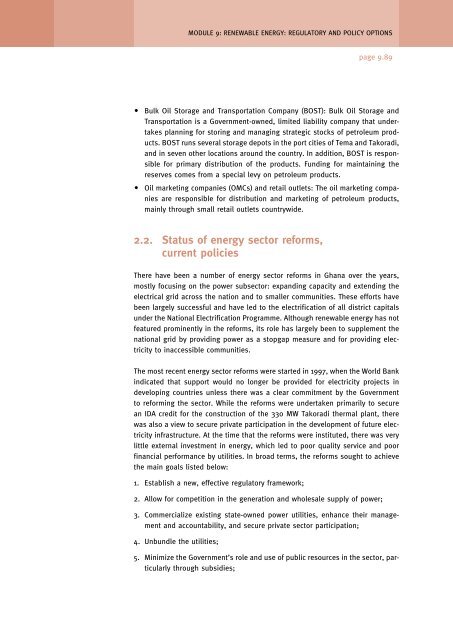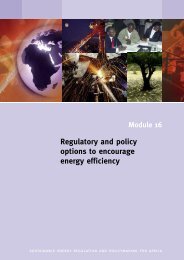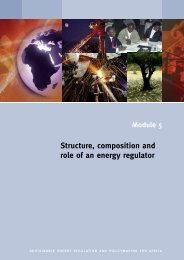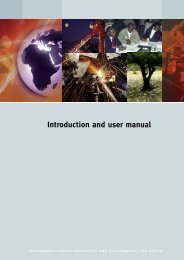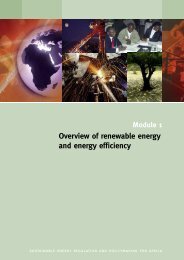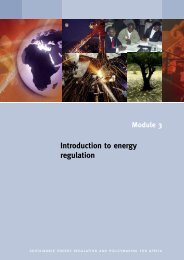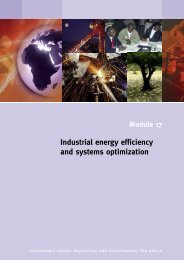Regulatory and policy options to encourage development of ...
Regulatory and policy options to encourage development of ...
Regulatory and policy options to encourage development of ...
- No tags were found...
You also want an ePaper? Increase the reach of your titles
YUMPU automatically turns print PDFs into web optimized ePapers that Google loves.
MODULE 9: RENEWABLE ENERGY: REGULATORY AND POLICY OPTIONSpage 9.89 Bulk Oil S<strong>to</strong>rage <strong>and</strong> Transportation Company (BOST): Bulk Oil S<strong>to</strong>rage <strong>and</strong>Transportation is a Government-owned, limited liability company that undertakesplanning for s<strong>to</strong>ring <strong>and</strong> managing strategic s<strong>to</strong>cks <strong>of</strong> petroleum products.BOST runs several s<strong>to</strong>rage depots in the port cities <strong>of</strong> Tema <strong>and</strong> Takoradi,<strong>and</strong> in seven other locations around the country. In addition, BOST is responsiblefor primary distribution <strong>of</strong> the products. Funding for maintaining thereserves comes from a special levy on petroleum products. Oil marketing companies (OMCs) <strong>and</strong> retail outlets: The oil marketing companiesare responsible for distribution <strong>and</strong> marketing <strong>of</strong> petroleum products,mainly through small retail outlets countrywide.2.2. Status <strong>of</strong> energy sec<strong>to</strong>r reforms,current policiesThere have been a number <strong>of</strong> energy sec<strong>to</strong>r reforms in Ghana over the years,mostly focusing on the power subsec<strong>to</strong>r: exp<strong>and</strong>ing capacity <strong>and</strong> extending theelectrical grid across the nation <strong>and</strong> <strong>to</strong> smaller communities. These efforts havebeen largely successful <strong>and</strong> have led <strong>to</strong> the electrification <strong>of</strong> all district capitalsunder the National Electrification Programme. Although renewable energy has notfeatured prominently in the reforms, its role has largely been <strong>to</strong> supplement thenational grid by providing power as a s<strong>to</strong>pgap measure <strong>and</strong> for providing electricity<strong>to</strong> inaccessible communities.The most recent energy sec<strong>to</strong>r reforms were started in 1997, when the World Bankindicated that support would no longer be provided for electricity projects indeveloping countries unless there was a clear commitment by the Government<strong>to</strong> reforming the sec<strong>to</strong>r. While the reforms were undertaken primarily <strong>to</strong> securean IDA credit for the construction <strong>of</strong> the 330 MW Takoradi thermal plant, therewas also a view <strong>to</strong> secure private participation in the <strong>development</strong> <strong>of</strong> future electricityinfrastructure. At the time that the reforms were instituted, there was verylittle external investment in energy, which led <strong>to</strong> poor quality service <strong>and</strong> poorfinancial performance by utilities. In broad terms, the reforms sought <strong>to</strong> achievethe main goals listed below:1. Establish a new, effective regula<strong>to</strong>ry framework;2. Allow for competition in the generation <strong>and</strong> wholesale supply <strong>of</strong> power;3. Commercialize existing state-owned power utilities, enhance their management<strong>and</strong> accountability, <strong>and</strong> secure private sec<strong>to</strong>r participation;4. Unbundle the utilities;5. Minimize the Government’s role <strong>and</strong> use <strong>of</strong> public resources in the sec<strong>to</strong>r, particularlythrough subsidies;


